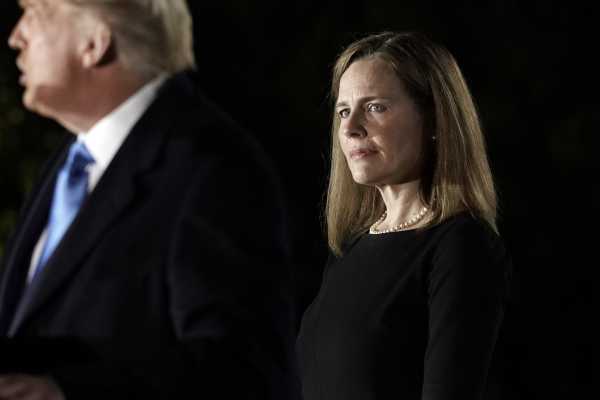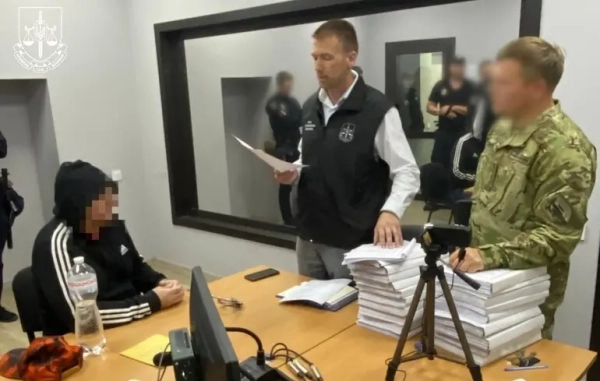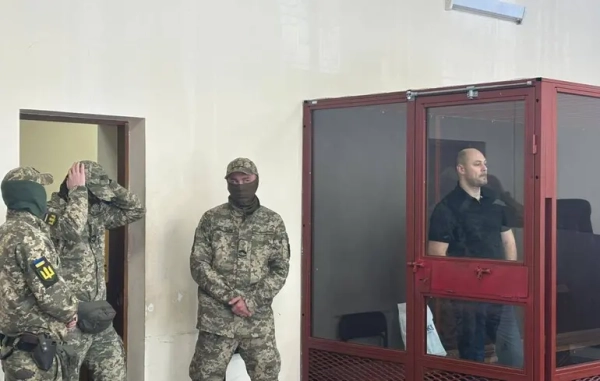
Ian Millhiser is a senior correspondent at Vox, where he focuses on the Supreme Court, the Constitution, and the decline of liberal democracy in the United States. He received a JD from Duke University and is the author of two books on the Supreme Court.
On the eve of Wednesday’s Supreme Court argument in Moore v. Harper, democracy in the United States appeared to be in danger.
A group of North Carolina Republican lawmakers asked the Court to embrace a deranged reading of the federal Constitution in order to force the state to adopt gerrymandered congressional maps. But that reading would, as former acting Solicitor General Neal Katyal told the justices on Wednesday, require them to strike down hundreds of state constitutional provisions protecting voting rights, limiting gerrymandering, and otherwise governing how elections are conducted.
Worse, prior to Wednesday, four of the Court’s Republican appointees had already endorsed versions of this misreading of the Constitution, which is known as the “independent state legislature doctrine” (ISLD).
On Wednesday, however, Trump-appointed Justice Amy Coney Barrett tossed cold water on the North Carolina GOP’s hopes that a majority of the justices would wholesale adopt this long-discredited theory. There is still a risk that the Court could adopt a milder version of the ISLD, in effect making itself the final arbiter of some election cases it doesn’t currently have jurisdiction over. But if you were alarmed by Moore’s potential to eviscerate fair elections in the United States, after today you can probably dial back that alarm to mere concern.
The ISLD derives from two provisions of the Constitution which state that the rules governing congressional and presidential elections shall be determined by each state’s “legislature.” More than a century of Supreme Court decisions hold that the word “legislature,” when used in this context, refers to whatever institutions in a state have the power to make laws — that is, not just the state’s house and senate, but also, for example, a governor with a veto power — and a bevy of dictionaries published around the time when the Constitution was drafted also define the word “legislature” as the Supreme Court has historically defined it.
The strongest form of the independent state legislature theory claims that all of these precedents are wrong, and that state governors, state courts, and state constitutions must be cut out of the process of determining how federal elections are conducted. As Justice Neil Gorsuch wrote in a 2020 concurring opinion endorsing the ISLD, “the Constitution provides that state legislatures — not federal judges, not state judges, not state governors, not other state officials — bear primary responsibility for setting election rules.”
At Wednesday’s argument, however, only Gorsuch — who spent an astounding amount of time drawing out a bizarre and often incomprehensible theory that the ISLD is an anti-racist doctrine that prevents state lawmakers from counting Black people as three-fifths of a person, as the US Constitution originally counted enslaved people — was openly sympathetic to very strong versions of the ISLD. Even Justice Samuel Alito, the Court’s most reliable Republican partisan, conceded that state courts must play some role in determining how elections are conducted, as it is their job to resolve disputes over how to interpret state election law.
That said, there were broad disagreements among the justices about whether the Supreme Court should intervene in what Chief Justice John Roberts at one point described as “outrageous” cases — that is, cases where a state supreme court egregiously misreads its own law.
Although the Supreme Court has long held that it is “bound to accept the interpretation of [state] law by the highest court of the State,” Alito’s questions seemed to imply that he should be able to toss out a state court’s interpretation of a state election law merely because he thinks that interpretation is bad.
Other justices, however, including some of the Court’s Republican appointees, expressed openness to more deferential rules that would only permit them to impose their will on the states in extraordinary cases. That is, while Alito appeared to want broad authority to intervene whenever he does not like a state court’s decision, Roberts and others seemed to suggest that the Supreme Court should only intervene in the most extreme cases.
The bottom line is that the Court is unlikely to light hundreds of voting rights and anti-gerrymandering protections on fire. That said, there is a real risk that the Court could give itself new power to intervene in election cases.
There are probably at least five votes to reject the most extreme versions of the ISLD
David Thompson, the lawyer representing the North Carolina Republicans, had a tough road ahead of him — at least if you assume that the justices of the Supreme Court care about existing law — because the Supreme Court has repeatedly rejected the independent state legislature theory over the course of more than a century.
In Davis v. Hildebrant (1916), for example, the Court upheld a provision of the Ohio constitution permitting the people of the state to veto state election laws via a popular referendum, even though that meant blocking a law enacted by the state’s legislative branch. The justices rejected the ISLD again in Smiley v. Holm (1932), which held that governors may veto election laws. And the Court most recently rejected it in Arizona State Legislature v. Arizona Independent Redistricting Commission (2015), which held that states may use a bipartisan commission to draw congressional maps — bypassing the state’s legislative branch in the process.
North Carolina Republicans, however, wanted the Court to unravel states’ power to protect voting rights by writing such protections into their constitution.
Thompson claimed that he does not want the Court to overrule any of its precedents to reach that outcome. He instead proposed several new, categorical rules. One is that state constitutions may impose “procedural” limits on how state election laws are enacted (such as requiring the law to be signed by the state’s governor), but that they can’t impose “substantive” limits on what those laws actually say. Another is that vague constitutional provisions — in Moore, the state supreme court struck down a gerrymandered congressional map because it violated a provision of the state’s constitution saying that “all elections shall be free” — cannot be enforced because there is no “judicially manageable standard” to determine the precise meaning of those provisions.
But Barrett appeared to have no sympathy whatsoever for these arguments. Among other things, she noted that this distinction between substance and procedure is “not so much grounded in the text” of the Constitution. She also pointed out that courts will struggle to determine the difference between a “substantive” and “procedural” provision in a state constitution — and so it is hard to figure out a “judicially manageable standard” for policing this line.
If Barrett rejects Thompson’s arguments, that’s probably the ballgame, at least with respect to his attempts to invalidate whole swaths of state constitutional law. All three of the Court’s liberals left no doubt that they weren’t buying what Thompson was selling. And, while Roberts endorsed a version of the ISLD in his Arizona State Legislature dissent, his more recent opinions suggest that he accepts his loss in that case and will not attempt to relitigate it.
That said, it is still possible that the Court will embrace a weak version of the ISLD that permits it to step in when state supreme courts utterly mangle the state’s election law. The question is whether they will go further than that.
The Court could still give itself the power to rewrite at least some state election law
Several justices, including Roberts and Justice Brett Kavanaugh, who are relative moderates on this extremely conservative Court, brought up Chief Justice William Rehnquist’s concurring opinion in Bush v. Gore (2000). There, Rehnquist claimed that the Florida Supreme Court’s interpretation of its own state’s election laws “impermissibly distorted them beyond what a fair reading required.”
While Roberts, Barrett, and potentially even Kavanaugh appeared likely to reject the extreme arguments offered by Thompson, they also appeared open to joining with the Court’s right flank in writing Rehnquist’s position in Bush into a majority opinion. If that happens, it matters a great deal how the Supreme Court determines what constitutes an “impermissible distortion” of state election law.
Alito, displaying his characteristic partisanship, argued that the North Carolina Supreme Court did so when it read anti-gerrymandering safeguards into a vague provision of the state constitution. The “worst thing we could do,” he claimed, “is to say that there is a limit [on state supreme courts], but it’s one that in practice can never be exceeded.” He also seemed to buy Thompson’s argument that vague state constitutional provisions can never be a fount of voting rights.
The problem with this argument, as Justice Sonia Sotomayor pointed out, is that the federal Constitution is also riddled with vague provisions, including the First Amendment’s shield over “the freedom of speech,” and the Fourteenth Amendment’s guarantee that no state shall deny anyone “the equal protection of the laws.” If courts cannot read broad rights into vague constitutional language, then hundreds of US Supreme Court decisions interpreting the Constitution are invalid.
It also appeared that at least some of Alito’s fellow Republican appointees rejected his approach. Roberts, at one point, appeared to draw a distinction between “ordinary” state supreme court decisions (which his Court would not question) and “outrageous” ones (where it might intervene). Kavanaugh suggested that federal review of state supreme courts should be “deferential.” Barrett used terms like “egregious,” “sky high,” and “no longer acting like a court” to describe the sort of state supreme court cases that would warrant federal review.
This Court has a history of announcing that it is giving itself a vaguely defined new power to intervene when it doesn’t like something that another arm of government has done, and then using that power in ways that appear partisan or ideological. So it is concerning that the justices appear willing to give themselves a new power to decide at least some disputes over state election law.
But a decision in Moore announcing that the Supreme Court may step in when “egregious” or “outrageous” cases arise is a far cry from the wholesale attack on free and fair elections proposed by Thompson, and embraced by Gorsuch.
It is likely, in other words, that the Court’s decision in Moore will not be a victory either for Democrats or for proponents of voting rights. But it is also likely that they will suffer the kind of defeat that is now common in a very conservative Supreme Court — and not the kind of cataclysmic loss that Gorsuch and Thompson would prefer.
Sourse: vox.com






